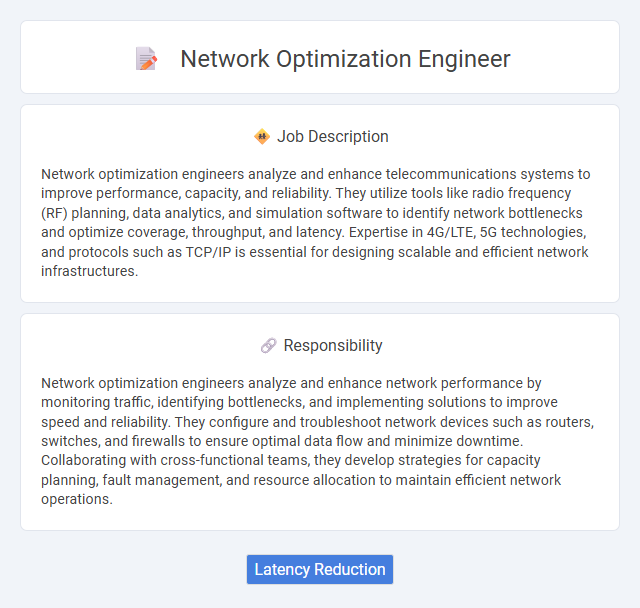
Network optimization engineers analyze and enhance telecommunications systems to improve performance, capacity, and reliability. They utilize tools like radio frequency (RF) planning, data analytics, and simulation software to identify network bottlenecks and optimize coverage, throughput, and latency. Expertise in 4G/LTE, 5G technologies, and protocols such as TCP/IP is essential for designing scalable and efficient network infrastructures.
Individuals with strong analytical skills and a methodical mindset are likely to thrive as network optimization engineers, as the role demands constant evaluation and improvement of network performance. Those who prefer dynamic problem-solving and can adapt to rapidly changing technological environments may find this job particularly suitable. However, professionals who struggle with high-pressure scenarios or lack technical proficiency might face challenges in meeting the demands of this position.
Qualification
A Network Optimization Engineer typically requires a bachelor's degree in Computer Science, Information Technology, or a related field, alongside certifications such as CCNA, CCNP, or equivalent. Proficiency in network performance analysis, traffic management, and optimization tools like Wireshark, SolarWinds, or NetScout is essential. Strong knowledge of routing protocols, LTE/5G networks, and hands-on experience with network planning and troubleshooting significantly enhances job performance.
Responsibility
Network optimization engineers analyze and enhance network performance by monitoring traffic, identifying bottlenecks, and implementing solutions to improve speed and reliability. They configure and troubleshoot network devices such as routers, switches, and firewalls to ensure optimal data flow and minimize downtime. Collaborating with cross-functional teams, they develop strategies for capacity planning, fault management, and resource allocation to maintain efficient network operations.
Benefit
Network optimization engineer roles likely offer significant benefits such as enhanced career growth opportunities due to the high demand for skilled professionals in network performance and efficiency. There is probable access to advanced technological tools and continuous learning environments that support professional development. Employees may experience improved job satisfaction from solving complex problems and contributing to the stability and speed of critical network infrastructure.
Challenge
Network optimization engineer roles likely involve complex challenges such as analyzing large volumes of network data to identify bottlenecks and performance issues. There is a probable need to develop innovative algorithms and strategies to enhance network efficiency and reliability under varying conditions. The position may require balancing cost constraints with technology advancements to maintain optimal network performance.
Career Advancement
Network optimization engineers specialize in enhancing telecom and IT infrastructure performance through data analysis, algorithm development, and system tuning. Mastery in advanced network protocols, big data analytics, and machine learning significantly boosts career progression opportunities within leading technology firms and telecom providers. Pursuing certifications like CCNP, AWS Certified Solutions Architect, or advanced data science qualifications accelerates advancement to senior engineer, architect, or managerial roles.
Key Terms
Latency Reduction
Network optimization engineers specialize in reducing latency by analyzing and enhancing data transmission paths, employing advanced algorithms to minimize delays in packet delivery. They utilize tools like traffic shaping, caching strategies, and protocol optimization to ensure real-time responsiveness and improve overall network performance. Expertise in technologies such as MPLS, SD-WAN, and edge computing contributes significantly to achieving minimal latency in complex network environments.
 kuljobs.com
kuljobs.com